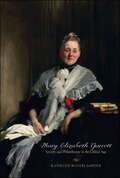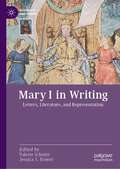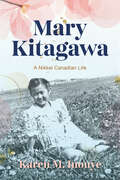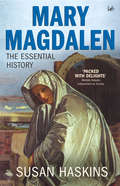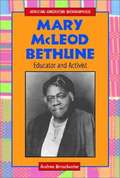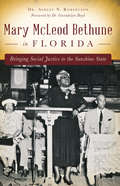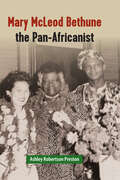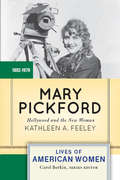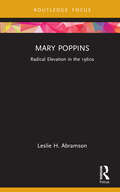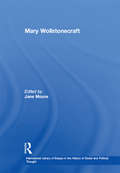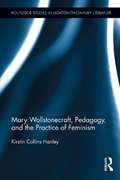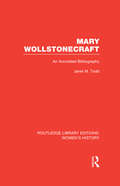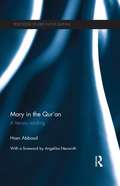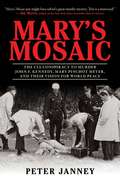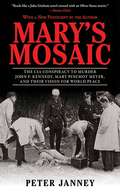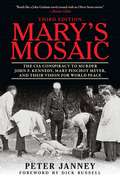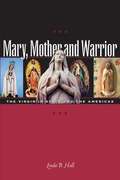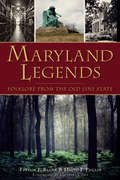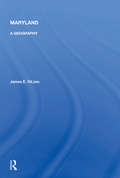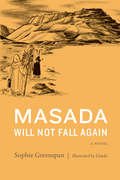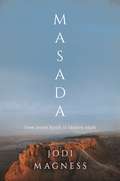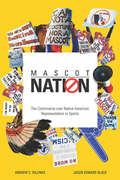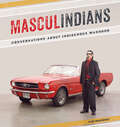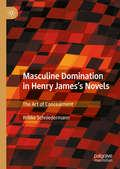- Table View
- List View
Mary Elizabeth Garrett: Society and Philanthropy in the Gilded Age
by Kathleen Waters SanderA captivating look at the remarkable life of this nineteenth-century suffragist, philanthropist, and reformer.Mary Elizabeth Garrett was one of the most influential philanthropists and women activists of the Gilded Age. With Mary's legacy all but forgotten, Kathleen Waters Sander recounts in impressive detail the life and times of this remarkable woman, through the turbulent years of the Civil War to the early twentieth century. At once a captivating biography of Garrett and an epic account of the rise of commerce, railroading, and women's rights, Sander's work reexamines the great social and political movements of the age.As the youngest child and only daughter of the B&O Railroad mogul John Work Garrett, Mary was bright and capable, well suited to become her father's heir apparent. But social convention prohibited her from following in his footsteps, a source of great frustration for the brilliant and strong-willed woman. Mary turned her attention instead to promoting women's rights, using her status and massive wealth to advance her uncompromising vision for women's place in the expanding United States. She contributed the endowment to establish the Johns Hopkins School of Medicine with two unprecedented conditions: that women be admitted on the same terms as men and that the school be graduate level, thereby forcing revolutionary policy changes at the male-run institution. Believing that advanced education was the key to women's betterment, she helped found and sustain the prestigious girls' preparatory school in Baltimore, the Bryn Mawr School. Her philanthropic gifts to Bryn Mawr College helped transform the modest Quaker school into a renowned women's college. Mary was also a great supporter of women's suffrage, working tirelessly to gain equal rights for women.Suffragist, friend of charitable causes, and champion of women's education, Mary Elizabeth Garrett both improved the status of women and ushered in modern standards of American medicine and philanthropy. Sander's thoughtful and informed study of this pioneering philanthropist is the first to recognize Garrett and her monumental contributions to equality in America.
Mary I in Writing: Letters, Literature, and Representation (Queenship and Power)
by Valerie Schutte Jessica S. HowerThis book—along with its companion volume Writing Mary I: History, Historiography, and Fiction—centers on representations of Queen Mary I in writing, broadly construed, and the process of writing that queen into literature and other textual sources. It spans an equally wide chronological and geographical scope, accounting for the years prior to her accession in July 1553 through the centuries that followed her death in November 1558 and for her reach across England, and into Ireland, Spain, Italy, Russia, and Africa. Its intent is to foreground words and language—written, spoken, and acted out—and, by extension, to draw out matters of and conversations about rhetoric, imagery, methodology, source base, genre, narrative, form, and more. Taken together, these two volumes find in England’s first crowned queen regnant an incomparable opportunity to ask new questions and seek new answers that deepen our understanding of queenship, the early modern era, and modern popular culture.
Mary Kitagawa: A Nikkei Canadian Life (Asian America)
by Karen M. InouyeThis book tells the story of Japanese Canadian activist Mary Kitagawa. In the aftermath of the Pearl Harbor bombing, Mary was one of roughly 22,000 Nikkei uprooted from their homes on the Pacific coast and forbidden to return to western British Columbia until long after World War II had officially ended. In the decades that followed, Mary and her family navigated financial precarity and ostracism, but also found ways to pursue both economic stability and political engagement. Beginning with Mary's grandparents, who were among the earliest immigrants to Canada from Japan, this book tracks the family's experiences—and those of the larger Nikkei Canadian community—from the late 1800s to the present. Concentrating on the interpersonal and intergenerational bonds that shaped Kitagawa, Karen M. Inouye describes the increasingly activist sensibilities that arose from transformative relationships—with family members, other members of the Nikkei Canadian community, Doukhobors, First Nations peoples, and white allies—as well as in response to the anti-Asian racism that Kitagawa encountered in many forms throughout her life. Inouye presents the Nikkei Canadian experience not as a linear triumph over a single adversity, but as a continual process of identity formation in relation to obstacles and opportunities, suffering and joy, isolation and connection.
Mary Magdalen: Truth and Myth
by Susan HaskinsA dramatic, thought-provoking portrait of one of the most compelling figures in early Christianity which explores two thousand years of history, art, and literature to provide a close-up look at Mary Magdalen and her significance in religious and cultural thought.
Mary McLeod Bethune
by Andrea BroadwaterTraces the life and achievements of the black educator who fought bigotry and sought equality for blacks in the areas of education and political rights. Includes bibliographical references and index.
Mary McLeod Bethune in Florida: Bringing Social Justice to the Sunshine State
by Ashley N. RobertsonA vibrant biography of the woman who shaped the political climate of Daytona Beach with her civil rights, women’s rights, and education activism.Mary McLeod Bethune was often called the “First Lady of Negro America,” but she made significant contributions to the political climate of Florida as well. From the founding of the Daytona Literary and Industrial School for Training Negro Girls in 1904, Bethune galvanized African American women for change. She created an environment in Daytona Beach that, despite racial tension throughout the state, allowed Jackie Robinson to begin his journey to integrating Major League Baseball less than two miles away from her school. Today, her legacy lives through a number of institutions, including Bethune-Cookman University and the Mary McLeod Bethune Foundation National Historic Landmark. Historian Ashley Robertson explores the life, leadership and amazing contributions of this dynamic activist.
Mary McLeod Bethune the Pan-Africanist
by Ashley Robertson PrestonHighlighting Bethune’s global activism and her connections throughout the African diaspora This book examines the Pan-Africanism of Mary McLeod Bethune through her work, which internationalized the scope of Black women’s organizations to create solidarity among Africans throughout the diaspora. Broadening the familiar view of Bethune as an advocate for racial and gender equality within the United States, Ashley Preston argues that Bethune consistently sought to unify African descendants around the world with her writings, through travel, and as an advisor.Preston shows how Bethune’s early involvement with Black women’s organizations created personal connections across Cuba, Haiti, India, and Africa and shaped her global vision. Bethune founded and led the National Council of Negro Women, which strengthened coalitions with women across the diaspora to address issues in their local communities. Bethune served as director of the Division of Negro Affairs for the Franklin D. Roosevelt administration and later as associate consultant for the United Nations alongside W.E.B. DuBois and Walter White, using her influence to address diversity in the military, decolonization, suffrage, and imperialism. Mary McLeod Bethune the Pan-Africanist provides a fuller, more accurate understanding of Bethune’s work, illustrating the perspective and activism behind Bethune’s much-quoted words: “For I am my mother’s daughter, and the drums of Africa still beat in my heart.” Publication of this work made possible by a Sustaining the Humanities through the American Rescue Plan grant from the National Endowment for the Humanities.
Mary Pickford: Hollywood and the New Woman (Lives of American Women)
by Kathleen A. FeeleyOn screen and off, movie star Mary Pickford personified the ?New Woman? of the early 1900s?a moniker given to women who began to demand more autonomy inside and outside the home. Well educated and career-minded, these women also embraced the new mass culture in which consumption and leisure were seen to play a pivotal role in securing happiness. Mary Pickford: Hollywood and the New Woman examines Pickford's role in the rise of industrial capitalism and consumer culture, and uses her life and unprecedented career as a wildly popular actress and savvy film mogul to illustrate the opportunities and obstacles faced by American women during this time.Following Pickford's life from her childhood on stage to her rise as a powerful studio executive, this book gives an overview of her enduring contribution to American film and mass culture. It also explores her struggles to surpass her confining public film persona as ?America's Sweetheart? with her creative and business achievements?mirroring how women, both then and today, must reconcile domestic life with professional aspirations and work.About the Lives of American Women series:Selected and edited by renowned women's historian Carol Berkin, these brief biographies are designed for use in undergraduate courses. Rather than a comprehensive approach, each biography focuses instead on a particular aspect of a woman's life that is emblematic of her time, or which made her a pivotal figure in the era. The emphasis is on a ?good read,? featuring accessible writing and compelling narratives, without sacrificing sound scholarship and academic integrity. Primary sources at the end of each biography reveal the subject's perspective in her own words. Study questions and an annotated bibliography support the student reader.
Mary Poppins: Radical Elevation in the 1960s (Cinema and Youth Cultures)
by Leslie H. AbramsonThis volume examines Mary Poppins as a 1960s film reflecting and invested in its radically changing times, a largely but not unmitigatedly antiestablishment musical resonant with conditions and issues powerfully affecting baby boomers. Among the explosion of baby boomer films that rocked the 1960s, the most stirring early work was likely Mary Poppins. This 1964 film captivated young audiences, earning top-grossing ticket sales, multiple Oscars, and landmark status as a cultural phenomenon. The book illuminates Mary Poppins as a musical teeming with preoccupations of American youth in the early-to-mid-1960s, including antiestablishment desires, anxieties, and pleasures. Reading against the dominant grain, this book deciphers Mary Poppins as a mid-century reflection that spans the generation gap, dysfunctional nuclear family, youth unrest, activism including feminist advocacy, counterculturalism, capitalist imperialism, race relations, socially conscious music, and hallucinogenic consciousness expansion. Conjunctively, the book explores tensions inherent in this studio production as a mainstream Disney release evoking imperatives of 1960s American youth while sanitizing figures and values representing radical change. Further, examining the film’s collective authorship, this volume traces Mary Poppins’ origins in the writings and life of nonconformist author P.L. Travers as well as in Disney cinema and the studio’s adaptation processes. Analysis extends to diverse facets of Mary Poppins’ reception, including the shifting image of its star, Julie Andrews, the film’s influence on popular culture and controversy among some as an adaptation, its appropriation by drug culture, association with the teenpic, and status as cinema of social consciousness. This book is ideal for students, researchers, and scholars of cinema studies and youth culture.
Mary Wollstonecraft (International Library of Essays in the History of Social and Political Thought)
by Jane MooreThe essays in this collection represent the explosion of scholarly interest since the 1960s in the pioneering feminist, philosopher, novelist, and political theorist, Mary Wollstonecraft. This interdisciplinary selection, which is organized by theme and genre, demonstrates Wollstonecraft's importance in contemporary social, political and sexual theory and in Romantic studies. The book examines the reception of Wollstonecraft's Vindication of the Rights of Woman but it also deals with the full range of her work from travel writing, education, religion and conduct literature to her novels, letters and literary reviews. As well as reproducing the most important modern Wollstonecraft scholarship the collection tracks the development of the author's reputation from the nineteenth century. The essays reprinted here (from early appreciations by George Eliot, Emma Goldman and Virginia Woolf to the work of twenty-first century scholars) include many of the most influential accounts of Wollstonecraft's remarkable contribution to the development of modern political and social thought. The book is essential reading for students of Wollstonecraft and late eighteenth-century women's writing, history, and politics.
Mary Wollstonecraft, Pedagogy, and the Practice of Feminism: Mary Wollstonecraft, Pedagogy, And The Practice Of Feminism (Routledge Studies in Eighteenth-Century Literature #9)
by Kirstin HanleyThis study examines Mary Wollstonecraft—generally recognized as the founder of the early feminist movement—by shedding light on her contributions to eighteenth-century instructional literature, and feminist pedagogy in particular. While contemporary scholars have extensively theorized Wollstonecraft’s philosophical and polemic work, little attention has been given to her understanding and representation of feminist practice, most clearly exemplified in her instructional writing. This study makes a significant contribution to the fields of both eighteenth-century and Romantic Era literature by looking at how early feminism influenced didactic traditions from the late-eighteenth century to today. Hanley argues that Wollstonecraft constructs a paradigm of feminist pedagogy both in the texts’ representations of teaching and learning, and her own authorial approach in re-appropriating earlier texts and textual traditions. Wollstonecraft’s appropriations of Locke, Rousseau, and other educationists allow her to develop reading and writing pedagogies that promote critical thinking and gesture toward contemporary composition theories and practices. Hanley underscores the significance of Wollstonecraft as teacher and mentor by revisiting texts that are generally assigned a short space in the context of a larger discussion about her life and/or writing, re-presenting her works of instruction as meaningful both in their revisionist approaches to tradition and their normative didactic features.
Mary Wollstonecraft: An Annotated Bibliography (Routledge Library Editions: Women's History #No. 381)
by Janet ToddFirst published in 1976, this was the first comprehensive annotated bibliography of Mary Wollstonecraft’s works and most of the critical and biographical comments on her in English written between 1788 and 1975. It is designed both as a research tool for scholars and students and as a revelation of the quantity and variety of comment. The book is divided into three main chronological time periods of publication date and suggests the vagaries of Wollstonecraft’s posthumous reputation and indicates the peaks and troughs of interest. Known as an eighteenth-century British writer, philosopher, and advocate of women's rights, Mary Wollstonecraft has received much critical attention with particular interest in her unorthodox lifestyle of the time and is now regarded as one of the founding feminist philosophers.
Mary in the Qur'an: A Literary Reading (Routledge Studies in the Qur'an)
by Hosn AbboudProviding an analysis of the complete story of Mary in its liturgical, narrative and rhetorical contexts, this literary reading is a prerequisite to any textual reading of the Qur’an whether juristic, theological, or otherwise. intertextuality between the Old Testament, New Testament and the Qur’an. The Qur’an is an oral event, linguistic phenomenon and great literature. So the application of modern literary theories is essential to have full comprehension of the history of the development of literary forms from pre-Islamic period such as poetry, story telling, speech-giving to the present. In addition, there is a need, from a feminist perspective, to understand in depth why a Christian mother figure such as Mary was important in early Islam and in the different stages of the development of the Qur’an as a communication process between Muhammad and the early Muslim community. Introducing modern literary theories, gender perspective and feminist criticism into Qur’anic scholarship for the first time, this book will be an invaluable resource for scholars and researchers of Islamic Studies, Qur’anic and New Testament Studies, Comparative Literature and Feminist Theology.
Mary's Mosaic
by Dick Russell Peter JanneyWinner - 2012 Hollywood Book Festival for General Non-FictionHonorable Mention - 2012 New England Book Festival for General Non-FictionHonorable Mention - 2012 London Book Festival for General Non-FictionWho really murdered Mary Pinchot Meyer in the fall of 1964? Why was there a mad rush by CIA counterintelligence chief James Angleton to locate and confiscate her diary? What in that diary was so explosive? Had Mary Meyer finally put together the intricate pieces of a plan to assassinate her lover, President Kennedy, with the trail ultimately leading to the CIA? And was it mere coincidence that Mary was killed less than three weeks after the release of the Warren Commission report?These are the questions that author Peter Janney finally answers in a way that no one else ever has. In doing so, he may well have solved Washington's most famous unsolved murder. Based on years of painstaking research and interviews, much of it revealed here for the first time, the author traces the key events and influences in the life of Mary Pinchot Meyer, including her first meeting with Jack Kennedy at the Choate School in 1936; her explorations with psychedelic drugs; her relationship with Timothy Leary; and finally how she supported the president as he turned away from the Cold War toward the pursuit of world peace. As we approach the 50th anniversary of President Kennedy's assassination--and Mary Meyer's--Mary's Mosaic adds to our understanding of why both took place.
Mary's Mosaic
by Dick Russell Peter JanneyWho really murdered Mary Pinchot Meyer in the fall of 1964? Why was there a mad rush by CIA counterintelligence chief James Angleton to immediately locate and confiscate her diary? What in that diary was so explosive and revealing? Had Mary Meyer finally put together the intricate pieces of a bewildering, conspiratorial mosaic of information that revealed a plan to assassinate her lover, President Kennedy, with the trail ultimately ending at the doorstep of the Central Intelligence Agency? And was it mere coincidence that Mary Meyer was killed less than three weeks after the release of the Warren Commission Report?Based on years of painstaking research and interviews, much of it revealed here for the first time, author Peter Janney traces some of the most important events and influences in the life of Mary Pinchot Meyer--including her first meeting with Jack Kennedy at the Choate School during the winter of 1936, her explorations with psychedelic drugs, and finally how she supported her secret lover, the president of the United States, as he turned away from the Cold War toward the pursuit of world peace. As we approach the fiftieth anniversary of President Kennedy's assassination--and Mary Meyer's--Mary's Mosaic adds to our understanding of why both took place.This paperback edition has been updated and revised with a significant postscript that focuses on Meyer's alleged assassin, who the author finally located and confronted in person in August 2012, as well as the ongoing saga of Janney's attempt to reopen the case based on new evidence.
Mary's Mosaic: The CIA Conspiracy to Murder John F. Kennedy, Mary Pinchot Meyer, and Their Vision for World Peace: Third Edition
by Dick Russell Peter JanneyExplores the murder of Mary Pinchot Meyer and her connected to President KennedyIdeal book for fans of The Devil’s Chessboard by David Talbot, The Reporter Who Knew Too Much by Dorothy Kilgallen, Dr. Mary’s Monkey by Edward T. Haslam, and other JFK conspiracy booksUpdated edition of the true crime expose, including new evidence and government documents corroborating the conspiracy to assassinate JFK’s trusted ally and final true loveThe death of Mary Meyer left many Americans with questions. Who really killed her? Why did CIA counterintelligence chief James Angleton rush to find and confiscate her diary? Had she discovered the plan to assassinate her lover, President Kennedy, with the trail of information ending at the steps of the CIA? Was it only coincidence that she was killed less than three weeks after the release of the Warren Commission Report?Fans of The Murder of Mary Russell, JFK: A Vision for America, and other JFK books will love Mary’s Mosaic. Building and relying on years of interviews and painstaking research, author Peter Janney follows the key events and influences in Mary Pinchot Meyer’s life—her first meeting with Jack Kennedy; her support of her secret lover, President Kennedy, as he worked towards the pursuit of world peace and away from the Cold War; and her exploration of psychedelic drugs. Fifty years after the assassinations of President Kennedy and Mary Meyer, this book helps readers understand why both took place. Author Peter Janney fought for two years to obtain documents from the National Personnel Records Center and the US Army to complete this third edition. It includes a final chapter about the mystery man who could be the missing piece to learn the truth behind Meyer’s murder.
Mary, Mother and Warrior: The Virgin in Spain and the Americas
by Linda B. HallA Mother who nurtures, empathizes, and heals . . . a Warrior who defends, empowers, and resists oppression. . . the Virgin Mary plays many roles for the peoples of Spain and Spanish-speaking America. Devotion to the Virgin inspired and sustained medieval and Renaissance Spaniards as they liberated Spain from the Moors and set about the conquest of the New World. Devotion to the Virgin still inspires and sustains millions of believers today throughout the Americas. This wide-ranging and highly readable book explores the veneration of the Virgin Mary in Spain and the Americas from the colonial period to the present. Linda Hall begins the story in Spain and follows it through the conquest and colonization of the New World, with a special focus on Mexico and the Andean highlands in Peru and Bolivia, where Marian devotion became combined with indigenous beliefs and rituals. Moving into the nineteenth century, Hall looks at national cults of the Virgin in Mexico, Bolivia, and Argentina, which were tied to independence movements. In the twentieth century, she examines how Eva Perón linked herself with Mary in the popular imagination; visits contemporary festivals with significant Marian content in Spain, Peru, and Mexico; and considers how Latinos/as in the United States draw on Marian devotion to maintain familial and cultural ties.
Maryland Legends: Folklore from the Old Line State (American Legends)
by Trevor J. Blank David J. Puglia Charles CampThe demon car of Seven Hills Road, the ominous Hell House above the Patapsco River, the mythical Snallygaster of western Maryland--these are the extraordinary tales and bizarre creatures that color Maryland's folklore. The Blue Dog of Port Tobacco faithfully guards his master's gold even in death, and in Cambridge, the headless ghost of Big Liz watches over the treasure of Greenbriar Swamp. The woods of Prince George's County are home to stories of the menacing Goatman, while on stormy nights at the nearby University of Maryland, the strains of a ghostly piano float from Marie Mount Hall. From the storied heroics of the First Maryland Regiment in the Revolutionary War to the mystery of the Poe Toaster, folklorists Trevor J. Blank and David J. Puglia unravel the legends of Maryland.
Maryland: A Geography
by James E. DiLisioAlthough one of the smallest of the fifty states, in many ways Maryland is the United States in miniature, bringing together and exemplifying the diverse elements of the country. In it the North and the South meet, and Maryland is one of the original gateways to the West. Maryland is a study in contrasts, combining the poverty of the Appalachian hill people, the sharecroppers of the South, and the inner-city dwellers of Baltimore with the affluence of country manor estates and fashionable suburbs. Some of America's most rural scenes are interspersed there with some of its largest metropolitan centers. Added to this is a great physical diversity—the Coastal Plain, the Piedmont, the Delmarva Peninsula, the Chesapeake Bay, and the Appalachian Highlands. This book provides an analytical survey of the physical, social, cultural, and economic geography of Maryland. Though the emphasis is on human geography, significant attention is given to the physical base on which the cultural landscape has developed. Environmental issues, such as Chesapeake Bay pollution, coal mining in Western Maryland, and the urbanization of the beaches, are addressed to show how development has often led to conflicts between people and their environments.
María Cano. La virgen roja
by Beatriz Helena RobledoLa historia de de María Cano, precursora de la emancipación de las mujeres en Colombia. María Cano es uno de los personajes colombianos del siglo XX que han despertado especial interés en los últimos años. La igualdad de género y el feminismo han revivido la importancia de esta precursora de la emancipación política y social de las mujeres. Aunque existen bosquejos biográficos, este es el primer proyecto que puede considerarse una biografía como tal. Su autora, Beatriz Robledo, reconocida por su biografía de Rafael Pombo, se pone en la piel de una mujer sembró una forma de pensar y de relacionarse que marcaría el futuro. Este libro es además un retrato de la Medellín de principios del siglo XX y de una Colombia avocada al conflicto.
Masada Will Not Fall Again: A Novel
by Sophie GreenspanThe mighty epic of Masada tells of Jews who preferred liberty to life itself. Their story centers on the bleak fortress of Masada in the Judean Desert after the conquest of Jerusalem and the destruction of the Holy Temple by the Romans in 70 CE. Here, in a last stand, Pharisees, Sadducees, and Essenes laid aside the differences that had crippled their resistance to the Romans and united in their zeal for God and country. Their leader was Eleazar ben Ya’ir, one of the great freedom fighters of Jewish history. This story brings to vivid life people who might have taken part in this great episode of Jewish history. It tells of the bridal couple, Adin and Ohada, from distant Babylonia; the winsome Urzillah from Nabatea, child of the caravan trails of the East; and Justus from Alexandria in Egypt, with his faithful wife, Sara, a convert to Judaism. Survivors from Jerusalem may well have included boys such as Iddo, of the priestly tribe; his friend and rival Aviel; and little Yitzhak, orphaned by the Romans and protected by Hannah, his grandmother and only surviving relative. Faith and courage belonged to them all—as they held a mighty Roman army at bay for three years. Even in their extremity they practiced and treasured the rites of their religion—blessing the new moon, circumcising the newborn infant, bathing in the mikveh (the ritual bath), and reciting the daily prayers. When all hope was gone they resolved to die as free men, women, and children. In turning their swords against themselves they ultimately denied victory to the Romans and the general Flavius Silva, for their memory has prevailed over that of their oppressors.
Masada: From Jewish Revolt to Modern Myth
by Jodi MagnessA new account of the famous site and story of the last stand of a group of Jewish rebels who held out against the Roman EmpireTwo thousand years ago, 967 Jewish men, women, and children—the last holdouts of the revolt against Rome following the fall of Jerusalem and the destruction of the Second Temple—reportedly took their own lives rather than surrender to the Roman army. This dramatic event, which took place on top of Masada, a barren and windswept mountain overlooking the Dead Sea, spawned a powerful story of Jewish resistance that came to symbolize the embattled modern State of Israel. The first extensive archaeological excavations of Masada began in the 1960s, and today the site draws visitors from around the world. And yet, because the mass suicide was recorded by only one ancient author—the Jewish historian Josephus—some scholars question if the event ever took place.Jodi Magness, an archaeologist who has excavated at Masada, explains what happened there, how we know it, and how recent developments might change understandings of the story. Incorporating the latest findings, she integrates literary and historical sources to show what life was like for Jews under Roman rule during an era that witnessed the reign of Herod and Jesus’s ministry and death.Featuring numerous illustrations, this is an engaging exploration of an ancient story that continues to grip the imagination today.
Mascot Nation: The Controversy over Native American Representations in Sports
by Jason Edward Black Andrew C. BillingsThe issue of Native American mascots in sports raises passions but also a raft of often-unasked questions. Which voices get a hearing in an argument? What meanings do we ascribe to mascots? Who do these Indians and warriors really represent? Andrew C. Billings and Jason Edward Black go beyond the media bluster to reassess the mascot controversy. Their multi-dimensional study delves into the textual, visual, and ritualistic and performative aspects of sports mascots. Their original research, meanwhile, surveys sports fans themselves on their thoughts when a specific mascot faces censure. The result is a book that merges critical-cultural analysis with qualitative data to offer an innovative approach to understanding the camps and fault lines on each side of the issue, the stakes in mascot debates, whether common ground can exist and, if so, how we might find it.
Masculindians: Conversations about Indigenous Manhood
by Richard Van Camp Tomson Highway Joseph Boyden Kim Anderson Gregory Scofield Sam Mckegney Lee Maracle Niigaanwewidam James Sinclair Basil H. Johnston Dana Claxton Daniel David Moses Louise Bernice Halfe Taiaiake Alfred Janice C. Hill Thomas Kimeksun Thrasher Brendan Hokowhitu Ty P. Tengan Warren Cariou Alison Calder Daniel Heath Justice Adrian Stimson Terrance Houle Kateri Akiwenzie-Damm Joanne Arnott Neal McleodWhat does it mean to be an Indigenous man today? Between October 2010 and May 2013, Sam McKegney conducted interviews with leading Indigenous artists, critics, activists, and elders on the subject of Indigenous manhood. In offices, kitchens, and coffee shops, and once in a car driving down the 401, McKegney and his participants tackled crucial questions about masculine self-worth and how to foster balanced and empowered gender relations. Masculindians captures twenty of these conversations in a volume that is intensely personal, yet speaks across generations, geography, and gender boundaries. As varied as their speakers, the discussions range from culture, history, and world view to gender theory, artistic representations, and activist interventions. They speak of possibility and strength, of beauty and vulnerability. They speak of sensuality, eroticism, and warriorhood, and of the corrosive influence of shame, racism, and violence. Firmly grounding Indigenous continuance in sacred landscapes, interpersonal reciprocity, and relations with other-than-human kin, these conversations honour and embolden the generative potential of healthy Indigenous masculinities.
Masculine Domination in Henry James's Novels: The Art of Concealment
by Wibke SchniedermannThis book proposes a new interdisciplinary approach to the gendered power relations in James’s novels. Reading James’s narrative form through the lens of relational sociology, specifically Pierre Bourdieu’s concept of symbolic domination, reconciles some of the most fiercely disputed positions in James studies of the past decades. The close readings focus on three novels, The Portrait of a Lady, The Wings of the Dove, and The Golden Bowl, providing a systematic relational analysis into the specifically Jamesian method of narrating the socio-psychological, embodied responses to masculine power and oppression. James persistently narrates his characters as social agents whose perception, affects, and bodily practices are products of the social structures that they in turn continue to shape and reproduce. The chapters trace a development throughout James’s career that reflects a growing sensitivity for the concealment and attendant misrecognition of gendered domination.
